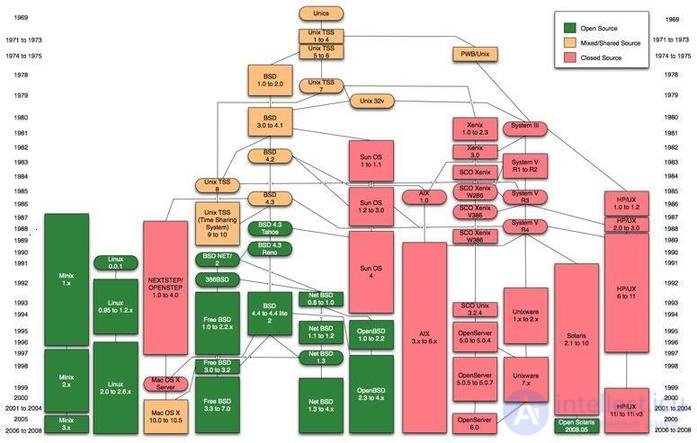Lecture
The UNIX system project (Uniplex Information and Computing Services) was created by AT & T employees at Bell Labs , C. Thompson and D. Ritchie, more than 20 years ago. The OS developed by them was implemented in assembly language. Initially, Bell Labs employee B. Kernigan called this system "UNICS". However, it soon became known as “UNIX”.
In 1973, D. Ritchie developed a high-level C (C) programming language, and soon UNIX OS was re-written in this language. After the publication of D. Ritchie and K. Thompson in 1974 in the journal CACM, the UNIX system was used everywhere.
The main problem of the OS of the UNIX family is the incompatibility of different versions. Attempts to standardize UNIX versions ended in failure, since two incompatible versions of this system were most prevalent: the AT & T line — UNIX System V and the Berkeley line — UNIX BSD. Many companies, based on these versions, have developed their UNIX versions: SunO • and Solaris from Sun Microsystems, AIX from IBM, UnixWare from Novell , etc.
One of the latest versions of UNIX System V Release 4 has gathered the best features of UNIX System V lines and BSD UNIX, but this type of system is incomplete because it lacks the system utilities necessary for successful use of the OS.
Common features for any UNIX OS are:
1) multi-user mode with a way to protect data from unauthorized access;
2) the implementation of multiprogram processing in the time-sharing mode, which is based on the use of algorithms preemptive multitasking; increased multiprogramming;
3) unification of input-output operations based on the advanced use of the concept of "file";
4) a hierarchical file system that forms a single directory tree regardless of the number of physical devices used to host files;
5) portability of the system, which is carried out by writing its main part in C;
6) various means of interaction of processes, for example through a network;
7) disk caching in order to reduce the average file access time.

Comments
To leave a comment
Informatics
Terms: Informatics